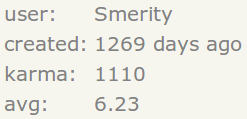The Wrong Type of Karma
May 12, 2013
Karma's a wonderful way to modify behaviour. If the majority of the users enforce the same set of guidelines, karma can lead to a self stabilising community.
Good actions are rewarded and bad actions are punished.
Karma can have unexpected effects though. Like any motivation system, if the distribution of rewards is not aligned with the aims of the program, it can encourage the wrong type of behaviour.
Before we get started, yes, I am one of those people who thinks about karma too much. It's the tool of choice when trying to maintain civility across the Internet. Whilst karma might not have a monetary value, it is coveted. It's a signal that you're a positive part of a community. Strangely enough, that little integer is a humanising factor. It indicates when you've positively contributed to the community you love and support.
Traditionally karma can become a problem when users decide to positively recognise behaviour that is considered outside the initial community's guidelines. Examples of this would be rewarding a funny but low content comment on a website that values high level discussion over humour. This again is primarily an issue when there is no majority consensus in a community or they're met with an endless influx of new users with no respect or understanding of the status quo (Eternal September). In these situations, karma can hasten the degradation of the community.
Let's assume there's a strong community consensus however and that September is infinitely far away. If the community is stable and a user has high karma, that means the user has been a positive contributor to the community.
What else might they measure themselves on, however? I'd wager my money on "any other integer within sight".

Exhibit A: karma from a completely anonymous discussion website. What do you notice initially? When my account was created, what my total karma is and the average karma each of my posts attract.
These numbers implicitly give two other interpretations of karma.
Days / Karma < 1 and Karma / Posts = 6.23.
One indicates your contribution per day to the community whilst the other indicates how recognised each contribution is.
I'd argue that average karma per post inspires the wrong behaviour on the website. Why? Karma per post relies on more than just the quality of the post. In fact, karma per post is more directly related to the number of users who saw it.
This discourages you from responding to or involving yourself in unpopular discussions.
Why does this bother me so much? Computer game companies make billions per year by convincing users that larger integers means more satisfaction. Similarly, my brain is hard wired to attempt to increase both the total karma and average karma. This means to win the game I need to avoid playing it whenever the post could gain less than 6.23 karma. Your brain thinks "Even if that post would be informative and helpful, it'd only assist a small number of people".
Well, starting today, I'm turning that hot wiring cold. Comment quickly, comment often. Obviously you should avoid spamming content, but simply recognise that if you have something positive to contribute, you should contribute it. If it helps one person or ignites a small but intellectual discussion, then that's reward enough. Average karma be damned.
Popular Articles
- It's ML, not magic: machine learning can be prejudiced
- It's ML, not magic: the rise of AI-prefix investing
- In deep learning, architecture engineering is the new feature engineering
- How Google Sparsehash achieves two bits of overhead per entry using sparsetable
- Where did all the HTTP referrers go?
Interested in saying hi? ^_^
Follow @Smerity
